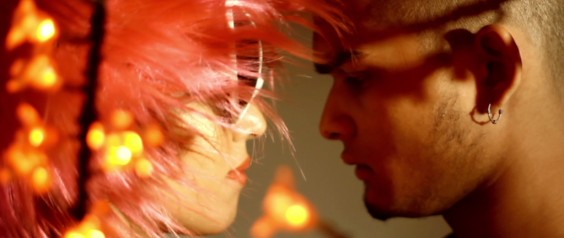GANDU (ASSHOLE)
(director/writer: Kaushik Mukherjee; screenwriter: story by Arif Hossain; cinematographer: Kaushik Mukherjee; editors: Kaushik Mukherjee, Manas Mittai, Surojit Sen; music: Neel Adhikari; cast: Anubrata Basu (Gandu), Joyraj (Rickshaw Driver), Rii Sen (The angel/hooker), Kamalika Banerjee (Gandu’s Mother), Shilajit Majumdar (Dasbabu, Gandu’s Mother’s Lover); Runtime: 85; MPAA Rating: NR; producers: Celine Loop, Kaushik Mukherjee; Netflix; 2010- (Black & White) India-in Bengali, with English subtitles)
“An angry cult film.”
Reviewed by Dennis Schwartz
In 2010 India banned the tabu film of Indian filmmaker Kaushik Mukherjee (“Garbage”/”Ludo”) for his controversial, revolutionary and downtrodden indie because of its graphic language, graphic violence and graphic pornographic sex. The low-budget unconventional drama played the following year in many international festivals and was well-received. It’s an angry cult film, filmed with defiance and tremendous visual energy. In an interview, the director said his intention was “to fuck-up your mind.” It takes form as a rap musical, a sometimes comedy, a sometimes drama, a sometimes documentary, and a sometimes metaphysical-drug related film.
Gandu translates as asshole, which is an abusive term in Bengali.
Gandu (Anubrata Basu) is the nickname of a 20 something idler who lives with his prostitute mom (Kamalika Banerjee) in the Howrah section of Kolkata, in a middle-class apartment complex. He gets money for gambling and drugs by stealing from his mom’s clients and boyfriend.
Gandu releases his pent-up anger by creating edgy musical videos of him singing rap songs.
He befriends another lost soul, the rickshaw driver who is obsessed with Bruce Lee and martial arts, and is aptly named Rickshaw (Bhattacharya). He’s also a loser, who goes with Gandu on an abusive heroin druggie trip, where they both are supplied by the evil drug-dealer (Shilajit Majumdar)–the lover of Gandu’s mom.
Using flash cuts, fancy subtitles and dazzling split screens, Mukherjee goes anti-mainstream Hollywood and populates the troubling film with obnoxious characters.
When the anti-hero visualizes God, he imagines how his life has turned around for the good. None of these things happen for real but give him delusional comfort: He wins the lottery, becomes a celebrated rap star, fantasizes fucking his dream girl (Rii Sen)–a married woman who frequents the same internet cafe he does without them making contact–and in his dream they appear together in a hardcore sex scene filmed in color.
It played at the 2011 London Film Festival.

REVIEWED ON 7/6/2024 GRADE: B